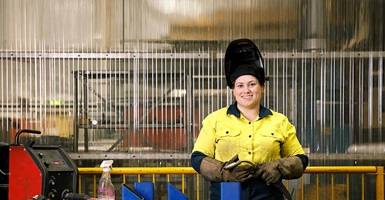5 jobs in the justice field
Real careers in criminology and justice
Is a career in justice right for you?
Studying within the justice field opens a huge range of career options – have you considered these five?
From assisting people within the courts to researching crime prevention, there are many career avenues within the legal and criminal justice systems.
Jim Vatousios, Educational Manager, Justice and Legal services at Chisholm says people who study justice courses can access a really diverse range of job opportunities.
“The biggest strength of a justice course is that it provides so many possibilities,” he says.
If you’re interested in a justice career, here are five common areas you may like to consider.
Policing
Jim says a justice course can be a steppingstone into policing, either as a sworn or non-sworn officer, depending on what you want to do within the force.
“A non-sworn officer doesn’t have a badge or a gun or anything like that,” he explains.
“They perform administrative functions that help support the running of the police force, like data entry, people management – all the admin positions that a large organisation requires.”
To become a sworn officer, you need to go through a rigorous recruitment process, including medical, psychological and fitness testing, and then complete a course at the policy academy – but a broad-base justice course can be a good starting point.
Courts and legal
There is also high demand for people with knowledge of the justice system to take on diverse roles within the courts.
For example, you could apply to become a trainee court registrar and play a crucial role in the day-to-day running of the court.
“Trainee court registrars assist the magistrate. They assist the people coming to the court – they do so many different things,” says Jim.
In this role, you’ll also make announcements and swear in witnesses, operate important audio-visual technology, and assist people with their enquiries about court processes.
Jim says other justice students get jobs in the private legal sector, working as legal assistants who provide administrative support to a legal team.
Corrections
The corrections area encompasses a range of roles, from prison and parole officers to case managers.
“When someone commits a crime, most don't go to prison – they're managed in the community by Corrections Victoria,” explains Jim.
“So, a lot of justice students get jobs as case managers who manage offenders in the community.”
As a case manager, you’ll work with people to make sure they meet their court and parole conditions and connect them to relevant services in their community.
Local government
With an understanding of the justice system, you could also find a role in local government.
“You could get a job in local laws, where you’ll work in regulatory services for a major local council,” says Jim.
Your responsibilities as a local laws officer could include animal management, parking and traffic enforcement, and even enforcing the Environmental Protection Act.
Criminology
If you’re interested in further study, you could work towards becoming a criminologist.
Criminology jobs are highly specialised, requiring a university degree, explains Jim.
“With a criminology degree, you can then work in research, in government departments that conduct research into crime, crime prevention, management of crime, criminal statistics, offender profiling – that's a different area altogether.”
A general justice course could give you credit towards a criminology degree.
How to tell if a justice job is right for you?
Justice jobs can be complex and can involve high-stress situations, so workers require good communicational skills and a level of emotional resilience.
“You have to have a very strong interest in working in a complex environment that constantly changes,” says Jim.
What do you learn in a justice course?
A justice course like Chisholm’s Diploma of Justice can help prepare you for the complex nature of the job.
Jim says he teaches his students a broad range of subjects, including the law and its application, the operation and functions of the criminal justice system, family violence, diversity, youth offending behaviour, and ways to reduce and combat crime.
“We prepare students for working in the criminal justice and legal systems, so when they have an interview, they can actually pass,” he says.
How can you get industry experience?
Some courses, like Chisholm’s, will help you find a practical placement in the industry, such as within the courts or at police academy.
“Practical placement allows a student the opportunity to experience firsthand the stuff they're learning in the classroom,” says Jim.
“It helps them see whether or not that kind of role is suitable for them – and also for the employer to see whether it's someone they wish to recruit down the track.”
Salary expectations and job prospects
Jim says there are many justice jobs currently available in Victoria and across Australia.
“The police are recruiting, corrections are recruiting, the courts are recruiting, local government is recruiting,” he says.
“There are very strong job prospects in all aspects of crime and the criminal justice and the legal system.”
For more information on job descriptions and salary expectations, take a look at these resources:
Interested in a career in justice? Check out Chisholm’s Diploma of Justice to see if it could be a good fit for you.


